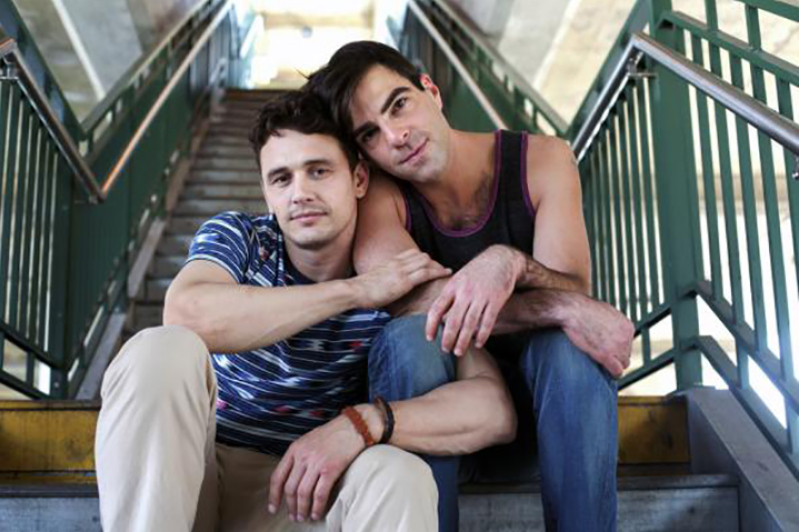
The film "I Am Michael" recently premiered at this year's Sundance Film Festival, telling the story of a man who once stood up for LGBT issues and gay rights who later ends up rejecting homosexuality, converting to Christianity and becoming a pastor.
Marlow Stern of The Daily Beast reported that the film centered on the life of Michael Glatze, who was once a prominent, award-winning gay activist and founder of the nonprofit group Young Gay America. Glatze wrote about his conversion to Christianity and renouncement of homosexuality on WoldNetDaily, a right-wing website, back in 2007.
"Homosexuality, delivered to young minds, is by its very nature pornographic. It destroys impressionable minds and confuses their developing sexuality; I did not realize this, however, until I was 30 years old," Glatze wrote. "It became clear to me, as I really thought about it - and really prayed about it - that homosexuality prevents us from finding our true self within. We cannot see the truth when we're blinded by homosexuality."
On film, Glatze's life is portrayed by American actor James Franco, who recently starred with Seth Rogen in "The Interview," a film that mocked North Korea and brought up issues of self-censorship in light of cyberattacks designed to halt its release. Kyle Buchanan of Vulture reported that Franco's latest film had "audiences talking" because it explored the "hot-button issues of sexuality."
"I could kind of feel the vibe from the audience that they were pretty surprised," film director Justin Kelly said, noting that Glatze sat in with him on a Sundance panel. "People definitely expect to see him vilified because of the people involved, but we really went for this nonjudgmental approach - even though I know the film might be different if a Christian pastor had made it."
Kelly added that Glatze "loved the film," talking about "how the film has changed his life."
Stern reported that much of the early press surrounding "I Am Michael" focused on a leaked image of a gay sex scene involving Franco and two other people. The actor commented on how the director managed to balance out that controversial scene.
"It seemed like a balancing act for Justin," Franco said. "Showing the three-way relationship and then skirting around it would be perceived as wimpy, and showing too much sex would be perceived as gratuitous, or would take over the movie."
According to Stern, the first half of "I Am Michael" focused on Glatze unapologetically living the life of a gay man while helping others as the managing editor of XY magazine, a San Francisco-based publication that taught others how to survive as a young, gay person. However, the second half then turned to Glatze's health scare, which later turned out to be heart palpitations.
"Worried that he's been afflicted by the same heart disease that took his father's life when he was 13, he undergoes a series of examinations that determine it's just a case of anemia caused by celiac disease," Stern wrote. "Following the episode, he decides to turn to Jesus and publicly renounces his homosexuality via a series of problematic articles and interviews."
Glatze defended his choice to become a Christian and follow Jesus in the article he wrote for WorldNetDaily back in 2007.
"Knowing no one who I could approach with my questions and my doubts, I turned to God," Glatze wrote. "I'd developed a growing relationship with God, thanks to a debilitating bout with intestinal cramps caused by the upset stomach-inducing behaviors I'd been engaged in."
The former gay rights activist started to question his views on homosexuality after he helped launch YGA Magazine in 2004. Glatze stated that although he was "considered a leader" in the gay rights movement, he "began to seriously doubt what I was doing with my life and influence."
"Soon, I began to understand things I'd never known could possibly be real, such as the fact that I was leading a movement of sin and corruption - which is not to sound as though my discovery was based on dogma, because decidedly it was not," Glatze wrote. "I came to the conclusions on my own."
Kelly acknowledged to Stern that Glatze was "a bit of an extremist" when he first converted to Christianity. He responded to those who questioned why Glatze's life should even be portrayed on film.
"The film is about so much more than gay men becoming straight," Kelly said. "It's about identity, why we label one another, why people want to be a part of a group, and the power of belief."
Sten reported that Glatze seemed to take the story in stride, noting that the former gay rights activist saw the film himself at Sundance.
"He thanked all of us, and it seemed like the movie was already-and will continue to be-a tool to help him heal," Franco said. "I think this movie has shown him a way to still be the person he wants to be today without destroying the person he was before."
Based on the article he wrote back in 2007, Glatze wrote that turning away from homosexuality "was the most liberating, beautiful and astonishing thing I've ever experienced in my entire life." He added that "guilt should be no reason to avoid the difficult questions."
"I was repulsive for quite some time; I am still dealing with all of my guilt," Glatze wrote. "As a leader in the 'gay rights' movement, I was given the opportunity to address the public many times. If I could take back some of the things I said, I would."






